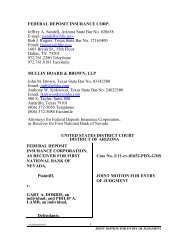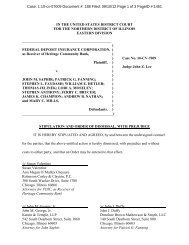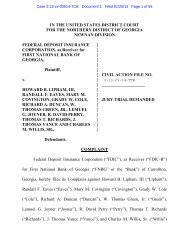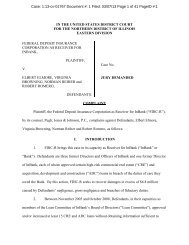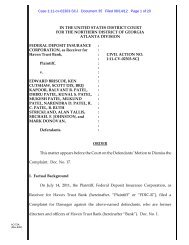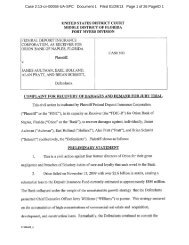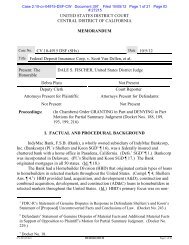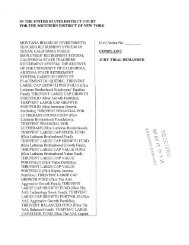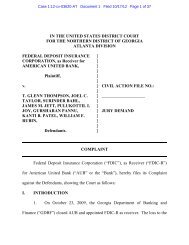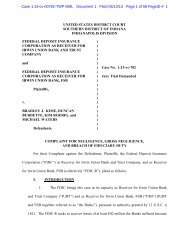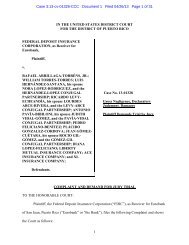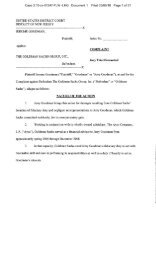UNITED STATES DISTRICT COURT EASTERN DISTRICT OF ...
UNITED STATES DISTRICT COURT EASTERN DISTRICT OF ...
UNITED STATES DISTRICT COURT EASTERN DISTRICT OF ...
Create successful ePaper yourself
Turn your PDF publications into a flip-book with our unique Google optimized e-Paper software.
2:11-cv-14816-BAF-MKM Doc # 33 Filed 09/24/12 Pg 1 of 6 Pg ID 1057<br />
PROGRESSIVE CASUALTY<br />
INSURANCE COMPANY,<br />
<strong>UNITED</strong> <strong>STATES</strong> <strong>DISTRICT</strong> <strong>COURT</strong><br />
<strong>EASTERN</strong> <strong>DISTRICT</strong> <strong>OF</strong> MICHIGAN<br />
SOUTHERN DIVISION<br />
Plaintiff, Civil Action No. 11-CV-14816<br />
vs. HON. BERNARD A. FRIEDMAN<br />
FEDERAL DEPOSIT<br />
INSURANCE CORPORATION and<br />
TIMOTHY J. CUTTLE,<br />
Defendants.<br />
______________________________/<br />
OPINION AND ORDER DENYING WITHOUT PREJUDICE<br />
PLAINTIFF’S MOTION FOR SUMMARY JUDGMENT<br />
This matter is presently before the court on plaintiff’s motion for summary judgment<br />
[docket entry 18]. Response and reply briefs have been filed. Pursuant to E.D. Mich. LR 7.1(f)(2),<br />
the court shall decide this motion without a hearing.<br />
This is a declaratory judgment action in which plaintiff Progressive Casualty<br />
Insurance Company (“Progressive”) seeks a declaration that a “directors and officers/company<br />
liability policy” it issued to Michigan Heritage Bank (“MHB”) does not afford any coverage to<br />
defendants Federal Deposit Insurance Corporation (“FDIC”) or Cuttle. In August 2011 the FDIC,<br />
as the receiver for MHB, filed suit against Cuttle, a former loan officer with MHB, in a related<br />
action, FDIC v. Cuttle, Civil Action No. 11-CV-13442 (E.D. Mich.). In that case, the FDIC alleges<br />
that Cuttle caused MHB to incur $8.2 million in losses by making or recommending loans in<br />
violation of the bank’s lending policies. Specifically, the FDIC alleges that “Cuttle failed to conduct<br />
adequate due diligence and analysis prior to originating and recommending approval of 11<br />
commercial loans that resulted in losses to the Bank, recommended the approval of those loans in
2:11-cv-14816-BAF-MKM Doc # 33 Filed 09/24/12 Pg 2 of 6 Pg ID 1058<br />
violation of the Bank’s lending policy . . . and prudent lending practices, failed to adequately inform<br />
MHB’s Board of Directors . . . and senior management of deficiencies with respect to those loans,<br />
and caused the Bank to fund loans even though borrowers had failed to satisfy prefunding<br />
conditions.” Id. Compl. 1. The FDIC’s claims against Cuttle sound in negligence and breach of<br />
fiduciary duty. According to the complaint in the instant action, both the FDIC and Cuttle have<br />
turned to Progressive for coverage of the losses alleged in 11-CV-13442. See Compl. 25.<br />
Progressive alleges that no coverage is available because (1) coverage is barred by an “insured<br />
versus insured exclusion” in the policy, and (2) the financial loss alleged in 11-CV-13442 does not<br />
come within the policy’s definition of “loss.”<br />
The coverage afforded by this policy is defined, in relevant part, in the “insuring<br />
agreements” section as follows:<br />
A. INSURED PERSONS LIABILITY COVERAGE<br />
The insurer will pay on behalf of the Insured Persons, Loss resulting<br />
from Claims . . . against the Insured Persons for which the Insured<br />
Persons are legally obligated to pay for Wrongful Acts, except for<br />
Loss the Company pays as indemnification.<br />
B. COMPANY INDEMNIFICATION COVERAGE<br />
The Insurer will pay on behalf of the Company, Loss resulting from<br />
Claims . . . against the Insured Person for which the Company has<br />
agreed to or is legally permitted or required by law to indemnify the<br />
Insured Persons for Wrongful Acts.<br />
Pl.’s Mot. for Summ. J., Ex. A4. The “insured versus insured exclusion,” found at paragraph J of<br />
the exclusions section of the policy, states:<br />
Insured vs. Insured Exclusion - The Insurer shall not be liable to<br />
make any payment for Loss in connection with any Claim by, on<br />
behalf of, or at the behest of the Company, any affiliate of the<br />
Company or any Insured Person in any capacity except where such<br />
Claim is brought and maintained:<br />
2
(1) in the form of a cross-claim or third-party claim for contribution<br />
or indemnity which is part of and results directly from a Claim which<br />
is not otherwise excluded by the terms of the Policy;<br />
(2) by an Insured Person solely as a customer of the Company;<br />
provided such Claim is brought independently of, and totally without<br />
the solicitation, assistance, participation, or intervention of any other<br />
Insured; or<br />
(3) by a security holder of the Company as a derivative action on<br />
behalf of the Company or such affiliate; provided such Claim is<br />
brought independently of, and totally without the solicitation,<br />
assistance, participation, or intervention of any Insured or any<br />
affiliate of the Company.<br />
Id.. “Loss” is defined, in relevant part, in paragraph N of the definitions section of the policy:<br />
Id.<br />
2:11-cv-14816-BAF-MKM Doc # 33 Filed 09/24/12 Pg 3 of 6 Pg ID 1059<br />
Loss means Defense Costs and any amount which the Insured<br />
Persons or the Company (if applicable) are legally obligated to pay<br />
resulting from a Claim, including damages, judgments, settlements,<br />
pre- and post-judgment interest, punitive or exemplary damages and<br />
the multiple portion of any multiplied damage award where insurable<br />
by law. Loss shall not include:<br />
* * *<br />
(3) any unpaid, unrecoverable or outstanding loan, lease or extension<br />
of credit to any customer or any forgiveness of debt; . . .<br />
In construing an insurance policy under Michigan law, the following rules apply:<br />
[T]he construction and interpretation of an insurance contract is a<br />
question of law for a court to determine . . . . Morley v. Automobile<br />
Club of Michigan, 458 Mich. 459, 465, 581 N.W.2d 237 (1998).<br />
Whether contract language is ambiguous is also a question of law . .<br />
. . Port Huron Ed. Ass’n v. Port Huron Area School Dist., 452 Mich.<br />
309, 323, 550 N.W.2d 228 (1996). It is axiomatic that if a word or<br />
phrase is unambiguous and no reasonable person could differ with<br />
respect to application of the term or phrase to undisputed material<br />
facts, then the court should grant summary disposition to the proper<br />
party pursuant to MCR 2.116(C)(10). Moll v. Abbott Laboratories,<br />
444 Mich. 1, 28, n.36, 506 N.W.2d 816 (1993). Conversely, if<br />
3
2:11-cv-14816-BAF-MKM Doc # 33 Filed 09/24/12 Pg 4 of 6 Pg ID 1060<br />
reasonable minds could disagree about the conclusions to be drawn<br />
from the facts, a question for the factfinder exists. Id.<br />
* * *<br />
Initially, in reviewing an insurance policy dispute we must<br />
look to the language of the insurance policy and interpret the terms<br />
therein in accordance with Michigan’s well-established principles of<br />
contract construction. Arco Industries Corp. v. American Motorists<br />
Ins. Co., 448 Mich. 395, 402, 531 N.W.2d 168 (1995).<br />
First, an insurance contract must be enforced in accordance<br />
with its terms. Upjohn Co. v. New Hampshire Ins. Co., 438 Mich.<br />
197, 207, 476 N.W.2d 392 (1991). A court must not hold an<br />
insurance company liable for a risk that it did not assume.<br />
Auto-Owners Ins. Co. v. Churchman, 440 Mich. 560, 567, 489<br />
N.W.2d 431 (1992). Second, a court should not create ambiguity in<br />
an insurance policy where the terms of the contract are clear and<br />
precise. Id. Thus, the terms of a contract must be enforced as written<br />
where there is no ambiguity. Stine v. Continental Casualty Co., 419<br />
Mich. 89, 114, 349 N.W.2d 127 (1984).<br />
While we construe the contract in favor of the insured if an<br />
ambiguity is found, Auto Club Ins. Ass’n v. DeLaGarza, 433 Mich.<br />
208, 214, 444 N.W.2d 803 (1989), this does not mean that the plain<br />
meaning of a word or phrase should be perverted, or that a word or<br />
phrase, the meaning of which is specific and well recognized, should<br />
be given some alien construction merely for the purpose of<br />
benefitting an insured. Upjohn Co, supra at 208, n. 8, 476 N.W.2d<br />
392. The fact that a policy does not define a relevant term does not<br />
render the policy ambiguous. Auto Club Group Ins. Co. v. Marzonie,<br />
447 Mich. 624, 631, 527 N.W.2d 760 (1994). Rather, reviewing<br />
courts must interpret the terms of the contract in accordance with<br />
their commonly used meanings. Group Ins. Co. of Michigan v.<br />
Czopek, 440 Mich. 590, 596, 489 N.W.2d 444 (1992). Indeed, we do<br />
not ascribe ambiguity to words simply because dictionary publishers<br />
are obliged to define words differently to avoid possible plagiarism.<br />
Upjohn Co, supra at 209, n.8, 476 N.W.2d 392.<br />
Henderson v. State Farm Fire and Cas. Co., 460 Mich. 348, 353-55 (1999).<br />
In its response to this motion defendant FDIC argues, among other things, that the<br />
motion is premature because certain terms of the policy are ambiguous and discovery is needed to<br />
delve into their meaning. In its reply plaintiff argues that the policy language is unambiguous and<br />
4
2:11-cv-14816-BAF-MKM Doc # 33 Filed 09/24/12 Pg 5 of 6 Pg ID 1061<br />
therefore no discovery is needed.<br />
The FDIC has made a sufficient showing under Fed. R. Civ. P. 56(d) that it should<br />
be permitted to complete discovery before having to respond substantively to plaintiff’s motion. The<br />
FDIC correctly notes that ordinarily it is improper for a court to dispose of a case on summary<br />
judgment before the parties have had an opportunity to conduct discovery. On this point the Sixth<br />
Circuit has stated:<br />
Typically, when the parties have no opportunity for discovery,<br />
denying the Rule 56(f) motion and ruling on a summary judgment<br />
motion is likely to be an abuse of discretion. Ball v. Union Carbide<br />
Corp., 385 F.3d 713, 719 (6th Cir.2004) (“It is well-established that<br />
the plaintiff must receive ‘a full opportunity to conduct discovery’ to<br />
be able to successfully defeat a motion for summary judgment.”);<br />
Vance, 90 F.3d at 1149 (“Most significant to the conclusion we reach<br />
is the fact that no discovery was conducted before the motion for<br />
summary judgment was filed and decided.”); White’s Landing<br />
Fisheries, Inc. v. Buchholzer, 29 F.3d 229, 231 (6th Cir.1994) (“Yet<br />
we nevertheless conclude that summary judgment should not have<br />
been awarded until the plaintiffs were allowed some opportunity for<br />
discovery.... In the instant case, we find that the grant of summary<br />
judgment, absent any opportunity for discovery, is such a misuse.”).<br />
CenTra, Inc. v. Estrin, 538 F.3d 402, 420 (6 th Cir. 2008). The FDIC indicates that the parties have<br />
engaged in very little discovery so far. Indeed, no scheduling order has been issued in the case yet.<br />
See August 8, 2012, text order (“Scheduling Conference to be scheduled after disposition of pending<br />
motion”). The FDIC has shown that some ambiguity exists in the insured versus insured exemption<br />
due to the “security holder exception,” the omission of a regulatory exclusion, and statements by<br />
plaintiff that regulatory suits, which might include the instant action, are covered. The FDIC has<br />
shown that some ambiguity exists in the definition of “loss” because the so-called “loan loss carve<br />
out” does not clearly exempt tortious conduct. The FDIC also points to plaintiff’s marketing<br />
materials which indicated that charged-off loan losses are covered, not excluded. Defendants should<br />
5
2:11-cv-14816-BAF-MKM Doc # 33 Filed 09/24/12 Pg 6 of 6 Pg ID 1062<br />
be permitted to delve into these areas and into the related areas identified in 14(a) - (f) of the<br />
Ruane Declaration, attached to the FDIC’s response as Ex. A, including plaintiff’s marketing<br />
materials and representations to insureds and regulatory authorities. Accordingly,<br />
IT IS ORDERED that plaintiff’s motion for summary judgment is denied without<br />
prejudice. The motion may be renewed after the completion of discovery.<br />
_s/ Bernard A. Friedman_______________<br />
Dated: September 24, 2012 BERNARD A. FRIEDMAN<br />
Detroit, Michigan SENIOR <strong>UNITED</strong> <strong>STATES</strong> <strong>DISTRICT</strong> JUDGE<br />
6



